A Stroll into the Unknown
You’re lost in Ikea, confidently insisting you know the way out because you've been here once before years ago. Your partner looks at you like you’ve grown a second head because you've passed the restaurant twice already and daylight is nowhere to be seen. If this scenario feels familiar or relatable, congratulations, you’ve experienced the labyrinth of ignorance.
As Ygritte told Jon Snow in Game of Thrones, “You know nothing, Jon Snow.” Sometimes we’re all like Jon Snow, blissfully unaware of our own unawareness.
Ignorance isn’t just not knowing something. It’s also believing we know a lot more than we do. It can take many forms, from an innocent lack of knowledge to wilful self-deception.
“Where ignorance is bliss, ’tis folly to be wise” - Thomas Gray
In this post, we’ll navigate the maze of ignorance from two angles: the Dunning-Kruger effect, the psychological equivalent of confidently singing off-key at karaoke, oblivious to the cringing crowd and Plato’s Allegory of the Cave, history’s most famous shadow puppet show.
By the end, you’ll see how overconfidence and illusion can trap us in a mental labyrinth and how to escape it.
The Dunning-Kruger Effect
Have you ever watched an audition episode of American Idol, X-Factor or any other TV talent shows and wondered, “Who told this person they could sing?” The likely answer: no one, they told themselves, courtesy of the Dunning-Kruger effect. This psychological phenomenon, identified by psychologists David Dunning and Justin Kruger in 1999, describes how people with only limited ability in a subject often overestimate their competence. In plain English, it’s the “I’m sure I’m a genius” or "how hard can this be" syndrome giving false confidence where it has not yet been earned.
The classic example is the story of McArthur Wheeler and Clifton Earl Johnson, the men who robbed two banks in Pittsburgh with their faces coated in lemon juice. Wheeler believed it would make them invisible to security cameras, because lemon juice can be used as invisible ink. Spoiler: it did not.
When the surveillance footage led to their quick arrest, Wheeler was genuinely shocked: “But I wore the juice,” he protested. This bizarre overconfidence in lemon juice directly inspired Dunning and Kruger’s research. They suspected that “people who know little, not those who know much, are often so sure of themselves” an idea echoing Charles Darwin’s observation that “ignorance more frequently begets confidence than does knowledge”.
Here’s how the Dunning-Kruger effect often plays out. Beginners, brimming with self confidence like the recently graduated university student who thinks he can run a Fortune 500 company from day one, or the friend who watched a Youtube Tutorial on playing the guitar and thinks they deserve a Grammy. Their confidence is sky high, but their actual competence is still at sea level.
Reality hits when their project flops or they butcher “Stairway to Heaven” at open mic night. Then they tumble into the “Valley of Despair,” where they finally realise this is much harder than I thought. If they persevere, gaining real skill and knowledge, they gradually climb the “Slope of Enlightenment” and reach the “Plateau of Sustainability” and a much more realistic confidence.
Research confirms this, in the original study, college students who performed in the bottom 12th percentile on tests estimated they were in the 62nd percentile. The worst performers thought they were above average.
The effect can be seen in other areas too, in business, unskilled managers may wildly overestimate their leadership skills, sinking departments or entire companies. In politics, we’ve seen world leaders brimming with confidence in decisions eventually proven to be disastrously wrong (Weapons of Mass Destruction anyone?). TV gives us Michael Scott from The Office, blissfully unaware of his ineptitude (but we love him anyway), or every talent show reject who can’t comprehend Simon Cowell’s scathing critiques. It’s as if a little knowledge or skill is a dangerous thing, just enough to inflate the ego, but not enough to recognise your own mistakes.
Psychologically, the Dunning-Kruger effect happens partly because of metacognitive blind spots. That was a new term for me, so to put it simply, the skills you need to be good at something are often the same skills you need to accurately assess how good you are. If you lack the skill in the subject, you also lack the awareness to know how good you actually are.
It's a double whammy Dunning called the “dual-burden of incompetence”. It’s like being so tone deaf you have no chance of knowing what in tune sounds like. You might honestly believe your shower singing could win The Voice.
“In the echo chamber of our own mind, even our off-key ideas sound like symphonies.”
In other words, we can all be legends in our own minds.
Dunning-Kruger isn’t saying dumb people think they’re brilliant at everything. It’s usually subject specific, you can be a great chef but horribly overestimate your dancing skills. Weirdly enough the opposite is also true where actual experts often underestimate themselves, because they know enough to know exactly what they don’t know. Shakespeare wrote:
“The fool doth think he is wise, but the wise man knows himself to be a fool.” - As You Like It
A true expert’s journey often begins by looking around and realising they’re in Plato’s dark cave.
Plato’s Cave: Shadows, Reality and Ignorance
Over 2,000 years before Dunning and Kruger, Plato served up an epic metaphor for human ignorance that still resonates in our Netflix era, with something that could be a plot to Black Mirror. Plato’s Allegory of the Cave is basically a philosophical horror/comedy about ignorance with shadows and shackles instead of jump scares and laugh tracks.
Imagine a group of people chained up in a dark cave since birth, facing a blank wall, it's all they've ever known. They can’t turn their heads to see behind them. There is a fire at their backs and a walkway where puppet masters use objects to cast shadows on the wall in front of the captives. For them these dancing shadows are their entire reality. They give them names, talk about them, perhaps they even start a fan club for Shadow #7. Echoes of voices bounce off the walls, so the prisoners assume the shadows can talk. It’s the only life they know, so it's real to them.
One day, one of the prisoners is freed. He stumbles, blinking like a mole when passing the fire and then through the cave’s exit to the outside world. The process is jarring, he’s confused and blinded. Slowly, as his eyes adjust he can make out real 3D objects, ones that aren't just shadows, trees, animals, rocks and then he finally beholds the sun itself, the ultimate symbol of truth and knowledge in Plato’s story.
Our enlightened escapee thinks, “By the beard of Zeus, the shadows are fake!” and he pities his cave friends, still stuck in their ignorance. So like any good protagonist, he goes back to rescue them. This, unfortunately, goes over about as well as trying to explain the internet to a medieval peasant. The cave dwellers don’t believe a word he says about the outside world. They think he’s talking shite. To make matters worse, having been in bright light, our hero now struggles to see in the dim cave, appearing clumsy and foolish bumping into things. The prisoners conclude leaving the cave made him stupid. If he tries to free them, they might just kill him to protect their comfortable worldview.
Cheery, isn't it? Plato intended his allegory to illustrate the human condition of ignorance: we are often content with shadows, illusions or half truths and we sometimes resist enlightenment because it might challenge our core beliefs. The cave is a prison of ignorance, and stepping out into the real world and gaining knowledge is hard work.
We might laugh at the cave people or pity them for not wanting out, but are we so different? Consider how we sometimes cling to “comforting illusions” like denying inconvenient facts, or remaining in our own little bubbles where our beliefs are never challenged.
I’m certainly guilty of living in a bubble, I don’t watch the news, I don’t seek out information on world events because honestly it’s usually all so depressing. I’m sat in the cave comfortable watching shadows on the wall.
As Morpheus in The Matrix might say, people are “so hopelessly dependent on the system, they will fight to protect it.”
The cave’s chains are psychological as much as physical: denial, fear, pride and even groupthink keep us staring at flickering shadows because the real world seems too daunting.
The proverb “Ignorance is bliss” mentioned previously comes from a poem where the author watches schoolboys at play and envies their carefree nature. The fact that they are so unaware of the turbulence of adulthood. In the cave, ignorance is a sort of bliss, the prisoners are content arguing about shadow puppets. Leaving the cave is painful and lonely. No wonder The Matrix’s Cypher echoed, “Ignorance is bliss,” as he schemed to be reinserted into a pleasantly fake reality complete with steak dinners. Plato and Socrates understood the bittersweet truth: Enlightenment has a price, and not everyone wants to pay it. Socrates famously said in a line so iconic it’s printed on T-shirts:
“The only true wisdom is in knowing you know nothing.”
Embracing that uncertainty is the first step to making it out of the cave.
When the Cave Meets Dunning-Kruger
Now imagine the Platonic cave-dwellers also suffered from the Dunning-Kruger effect. Not only are they chained up and mistaking shadows for reality, but they’re also utterly confident that they’ve got it all figured out. Sounds a lot like some corners of the internet, doesn’t it?
This is where overconfidence and misinformation feed each other in a vicious cycle. In modern terms, think about conspiracy theories, such as the flat Earth theory. Someone finds themselves watching cherry-picked YouTube videos, reading tweets from similar sources and they build up a narrative, lacking real evidence or facts, but thanks to Dunning-Kruger, they’re supremely confident they see more than the rest of us “sheeple.” So they double down in the darkness and anyone who tries to enlighten them by providing them with evidence is treated like Plato’s returning prisoner and ridiculed or attacked for their “foolish” beliefs.
Politics is rife with these mashups, more so now than ever before. History shows regimes where propaganda convinced entire populations of grand falsehoods, and often the less someone actually knew, the more certain they were of the party line.
In the business world, a CEO may be so insulated and surrounded by "Yes men" that they push a spectacularly ignorant decision over the line into action. A case study being the Kodak executives who scoffed at digital photography as a “shadow” that would never replace film. Or tech leaders in the early 2000s declaring the iPhone would flop.
The film Idiocracy portrays a whole society in a Dunning-Kruger Cave, people so dumbed down yet confident that a literal average Joe from the past becomes the smartest person in the world. It’s a silly film but an interesting take on the fact that humanity reached it’s intellectual zenith and is getting more stupid as we learn to rely more on technology.
Social media algorithms, some would argue, build custom caves for each of us. In our own personal echo chambers we are shown shadows (posts, news, opinions) that align with our existing beliefs. If we spend enough time consuming shadows we may feel like an experts on issues we’ve never examined critically. Confidence grows whilst perspective narrows. The Dunning-Kruger effect loves this setup: a person can slide into being both ignorant and overconfident, without any malicious intent. It’s how sketchy movements gain traction, and why Mark Twain’s quip still rings true:
“All you need in this life is ignorance and confidence; then success is sure.”
When you combine the illusions of the cave with Dunning-Kruger’s overconfidence, you get a potent mix. It’s like being lost in Ikea but firmly believing you’re on the right path. The result can be individuals, or even whole societies confidently marching in the wrong direction. It’s a bit scary, but recognising this pattern is the first step to breaking it.
How to Escape the Labyrinth
Alright, enough doom and gloom. Let’s look for the exit door of this labyrinth. If we’re all prone to self-deception at times, how can we be less wrong and maybe even occasionally wise? Consider these practical steps for cultivating intellectual humility and critical thinking:
Embrace Your Inner Socrates: Start by admitting, “I know nothing.” This isn’t self-deprecation, it’s freedom. As the novelist George R.R. Martin wrote, “The man who reads nothing at all is better educated than the man who reads nothing but newspapers”, highlighting that shallow information can be more dangerous than none at all. Acknowledge the gaps in your knowledge.
My daughter told me today that your "wingspan", the length from the tip of your finger on your left hand to the tip of your finger on your right hand with your arms outstretched is equal to your height. I have never heard of this before and I doubted it, but then we tested it, measured it and she was right, at least in the case of the two of us. I went from non-believer to admitting I was wrong and learning something new, just like that.
Seek the Sunlight (Knowledge): Get curious and venture outside your comfort zone. Read broadly, seek out the perspectives you disagree with. If you’re a die-hard Marvel fan convinced no DC movie can offer you wisdom, watch The Dark Knight and vice versa. In politics, read the other side’s reputable sources. It’s uncomfortable at first but over time, exposing yourself to light (i.e. credible information and diverse viewpoints) widens your perspective. It’s harder for shadows to survive in a well lit mind.
Ask, Don’t Assume: Cultivate the habit of asking questions, especially when you think you already know the answer. “Why do I believe this? What evidence would change my mind? Have I considered other explanations?” Even simply asking others, “What do you think?” and listening actively can burst your bubble of overconfidence.
Beware the Echo Chamber: In the digital age, escaping ignorance means escaping algorithmic caves. Consciously diversify your feed. Follow people who fact-check and who have different life experiences. If five friends share the same shocking headline, before you join the outrage, do a quick search to see if it’s true (Snopes is your friend!). Remember, a lie can travel halfway around the world while the truth is putting its shoes on (a misquote often attributed to Twain). Don’t amplify shadows; seek the source of light.
Practice Intellectual Humility: A fancy term for being okay with being wrong. If someone corrects you with solid evidence, thank them. It’s like they just showed you a secret tunnel in the labyrinth. Hard as it is, try not to take it personally when a belief is challenged. We are not our ideas; we have ideas, and those ideas can be updated in light of new information.
My daughter was pleased as punch to have taught me something, she wanted to rub it in my face and I let her, because I wanted her to see that there's nothing wrong with admitting you were wrong, a lesson that she could do with learning.
Leverage the “Unknown Unknowns”: Former U.S. Defence Secretary Donald Rumsfeld once distinguished between known knowns, known unknowns, and unknown unknowns. A mouth full for sure but by acknowledging the existence of “unknown unknowns”, you stay humble and ready to learn. It’s like carrying a map labelled “Here be dragons”, it reminds you the map you see isn't the full story, there are territories still to be discovered.
Find Guides and Mentors: In labyrinth lore, Theseus had a ball of thread and Ariadne’s guidance to escape the Minotaur’s maze. In life, seek mentors, teachers, or even reliable authors who can be your Ariadne’s thread. People who challenge you and support you in growth. A good mentor or honest friend will tell you when you’re singing off-key or staring at shadows. Value the feedback when you get it, there are very few people in life who will be completely honest with you, rather than telling you what you want to hear.
Laugh at Yourself: Not taking yourself too seriously is a superpower. If you catch yourself in a Dunning-Kruger moment (we all have them), find the humour in it. “There I go, thinking I’m Gordon Ramsay after cooking one decent pasta dish.” Humour defuses defensiveness. It’s hard to be mad at yourself when you’re busy laughing. Plus, comedy often reveals truth as comedians from George Carlin to John Stewart have shown, sometimes it takes a joke to illuminate widespread ignorance.
By practicing these steps, you won’t banish ignorance completely, but you’ll manage it. Ignorance, like the common cold, is a chronic human condition; but critical thinking and humility are the vitamins and exercise that keep it in check. Each step out of the cave makes it less likely you’ll be the guy with lemon juice on his face muttering, “But I wore the juice…”
From Shadows to Light
In the end, navigating the labyrinth of ignorance is a lifelong adventure. There will always be new caves, new things we don’t understand, new self-deceptions whispering that comforting lie, “you’ve got it all figured out.” Every expert was once a novice lost in the maze. What sets the wise apart is their willingness to say “I might be in the dark here, time to shed some light on the situation.”
It’s okay not to know something, it’s not okay to stop seeking knowledge. The world is vast, and reality has a beauty that shadows on a wall can never capture. Each of us must choose to trade ignorance for the often complicated truth.
Ultimately, the Labyrinth of Ignorance isn’t a prison it’s a puzzle. And puzzles are meant to be solved. So be the hero of your own story: question, learn, unlearn, relearn, and share the ride with others. Your courage to admit “I don’t know, but I want to find out” might just inspire someone else to put on their explorer’s hat and join you in the sunshine outside the cave.
Now, over to you: What assumptions will you challenge today? The exit of the labyrinth is waiting.
If you have managed to read or listen to all of these words, well done. I know that was a bit long. What I love is how some people have the knack of summing up a concept in the most simple and accessible way possible, with an image.
did this in his note from last month which I discovered after writing this post. Hats off to you for the visualisation Tom!

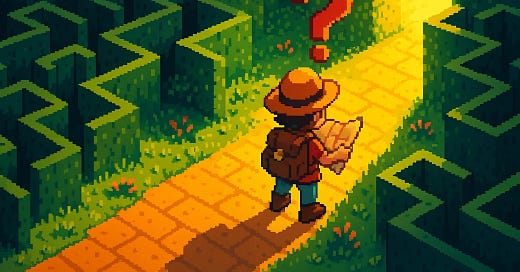



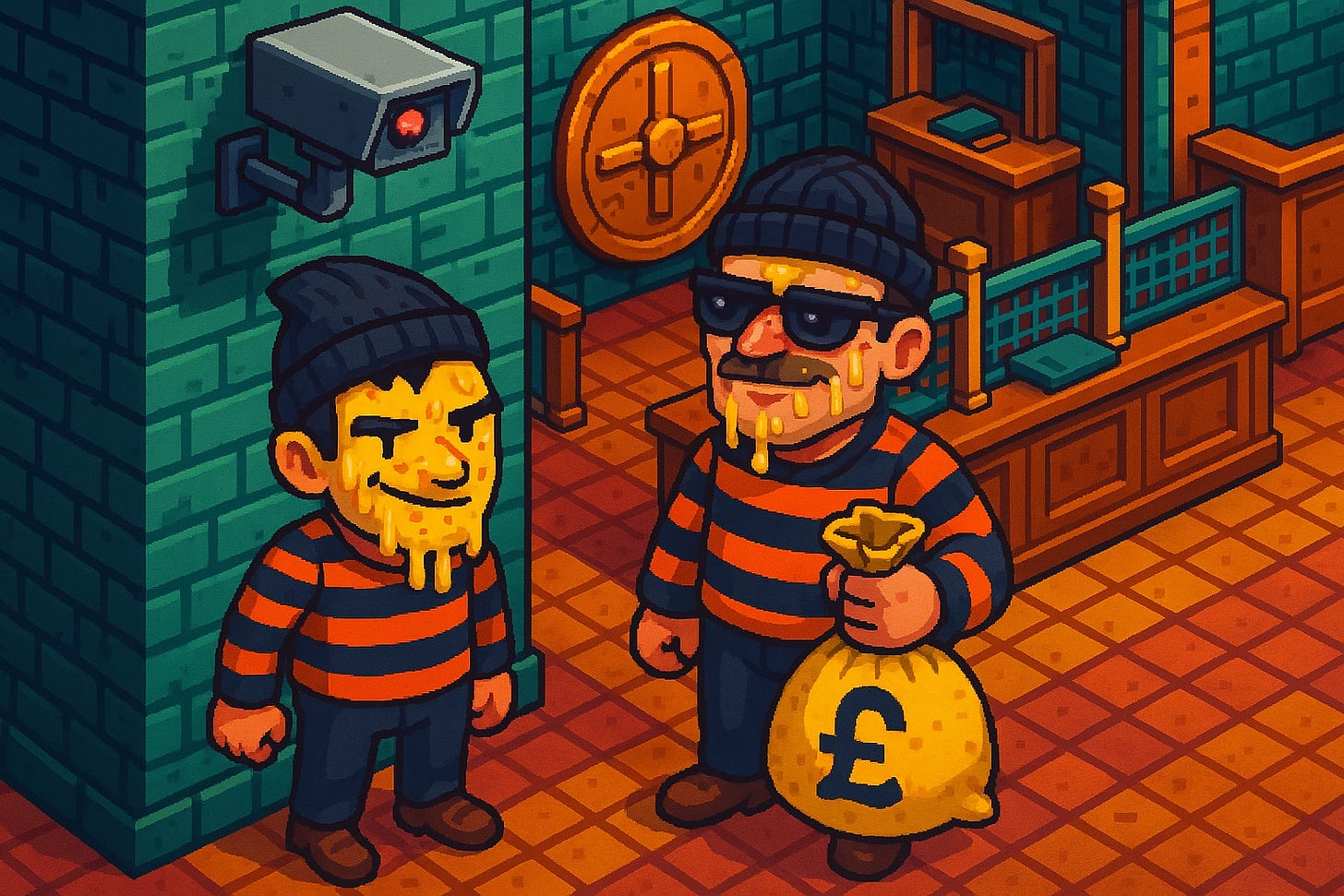

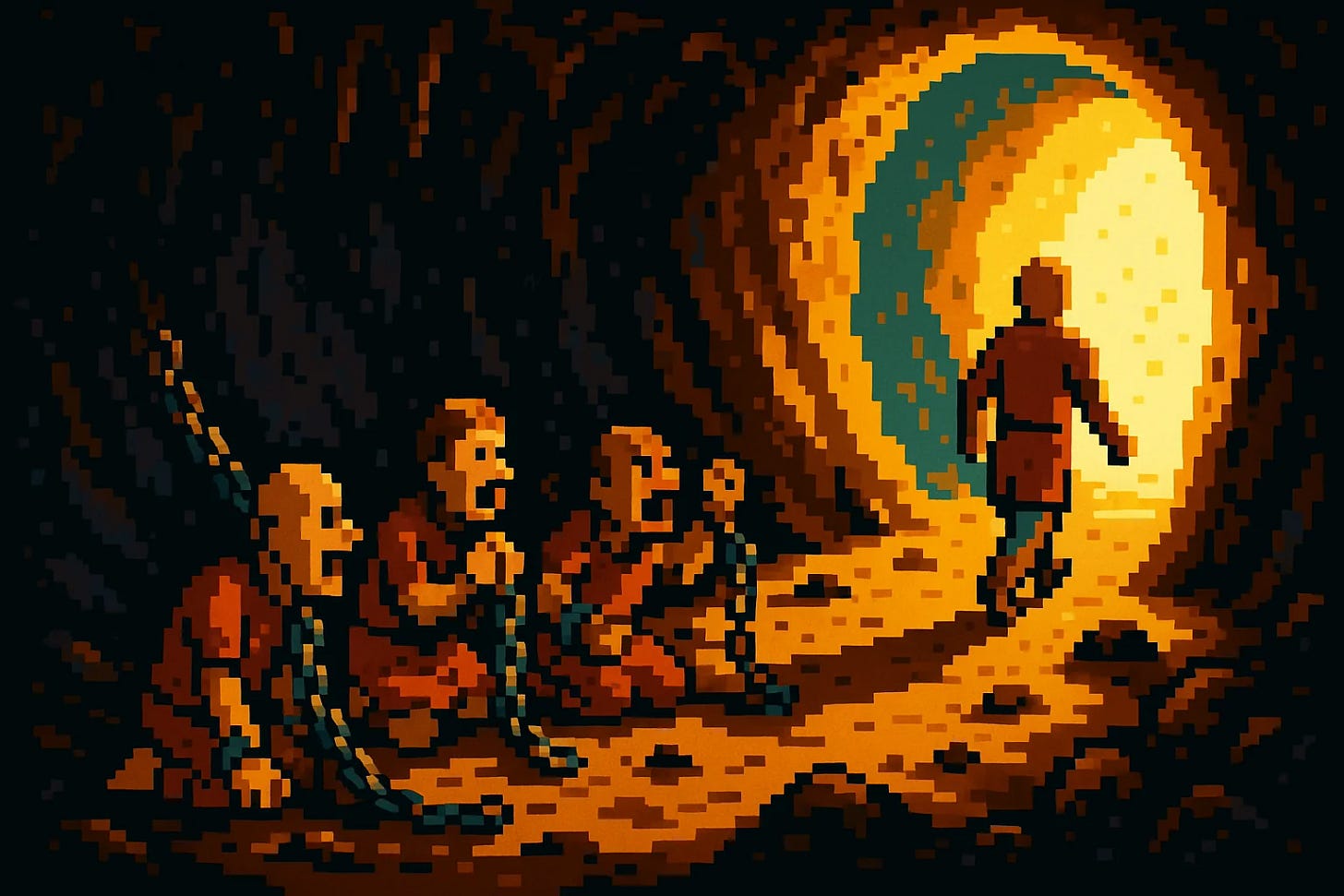
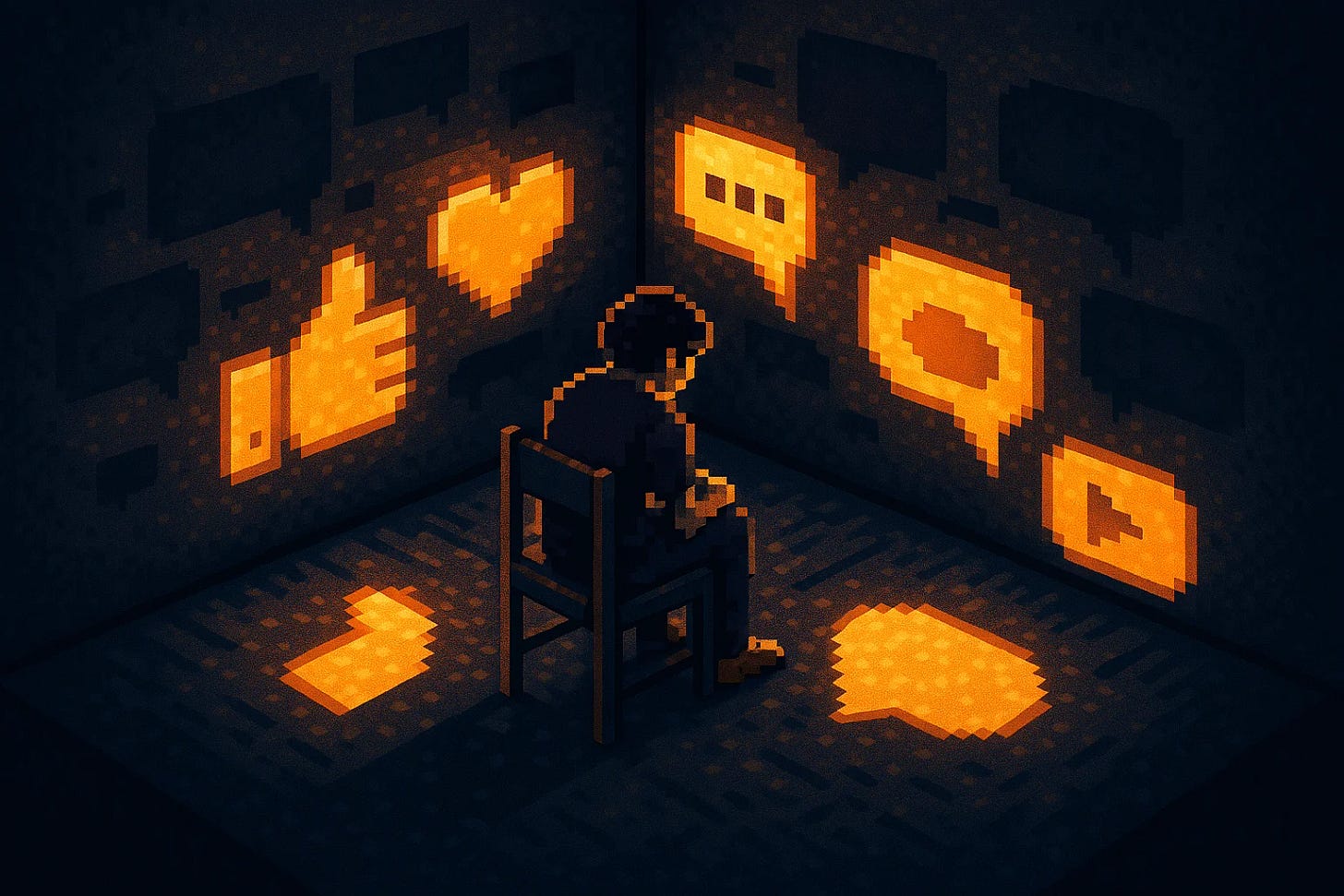

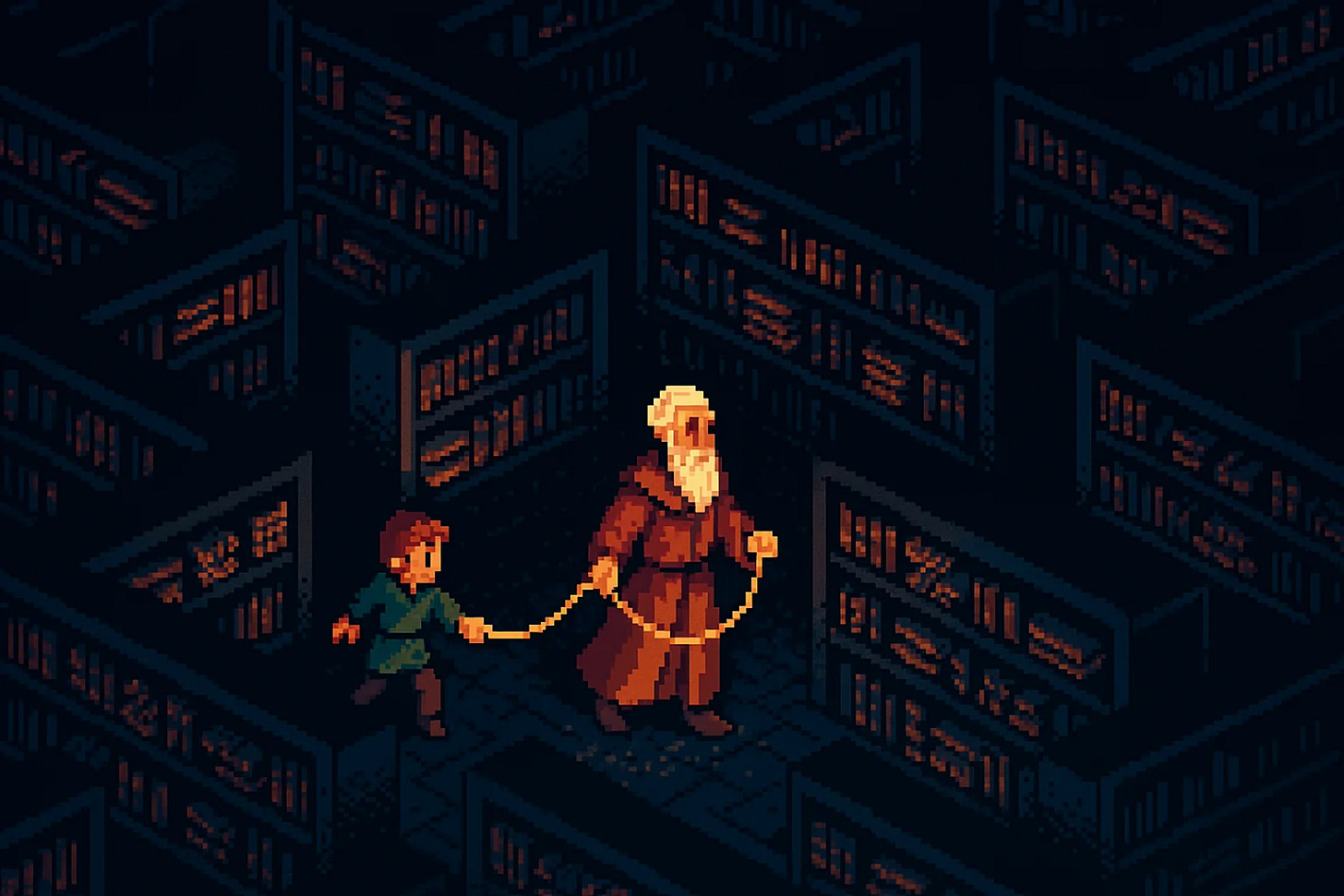
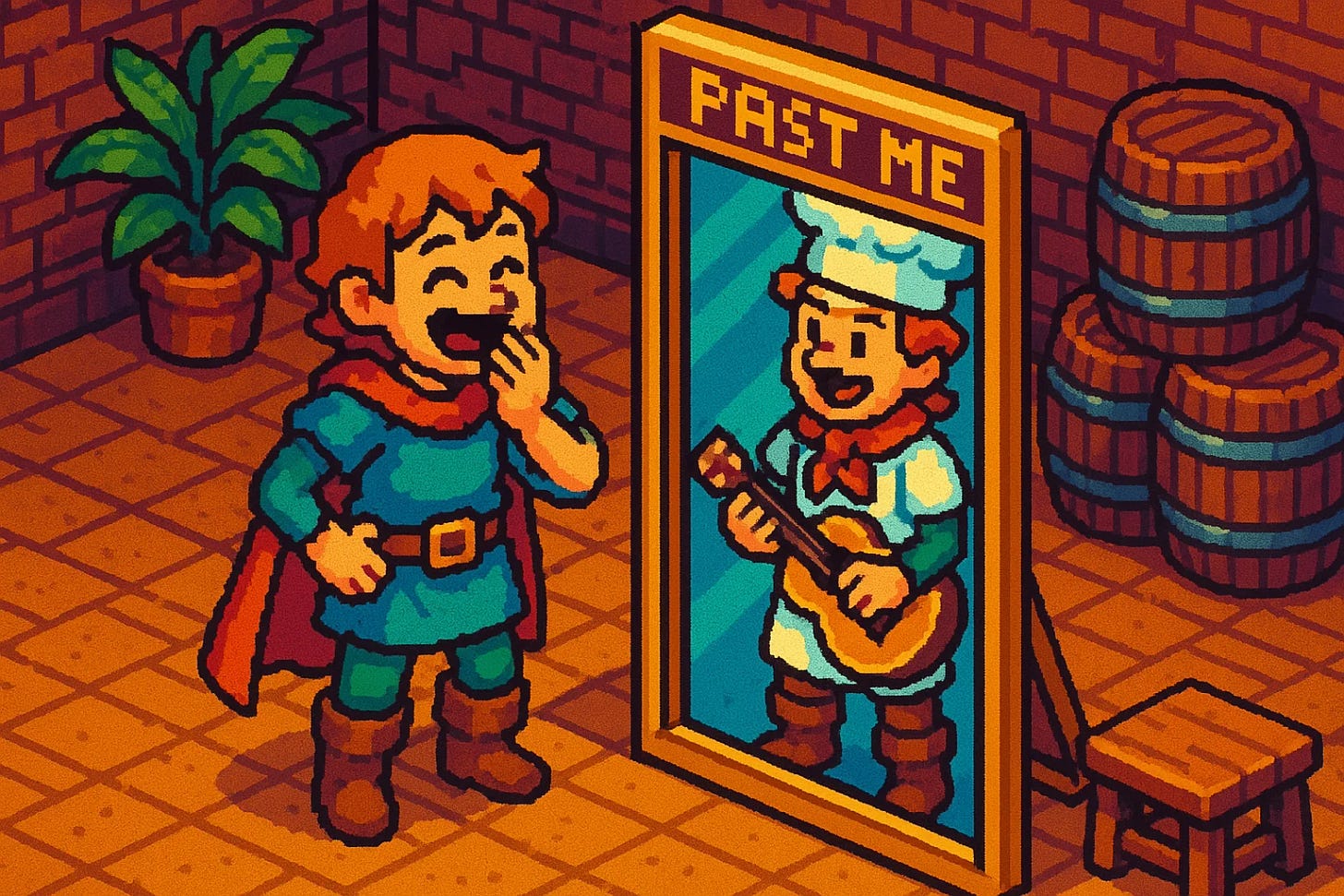
Soooooo it's finally here the worth 20 min listen..
Oh wow you've got perfect quotes for every circumstances Sir.
At first i thought... "Wait i feel seen. Ok this is just about me. You overconfident indolent girl. You just made fun of writing in the face of writers with your niche-less writing and oh my God a bathroom singer is better in singing than you and your writing. How in the world you think you can write" Bang bang bang one after another all shots made holes in my head.
Fine then Sara 'As You Like It' go 'wear the lemon juice' and see if you can hide.
Wait am i also in the fan club for shadow #7. Am i living in Plato's cave. Is there anything beyond this dark cave. Should i move from that spot and explore 3D reality and search for the sun or just believe this digital 2D is enough to belief. MmHmmmm.... Where's the map for exit?!
I tell you with my utmost honesty i was so deep in thoughts and in your calm calm guiding buttttttt my phone jumped in my hand the moment i heard you "By the beard of Zeus, the shadows are fake!” i almost lost all my thoughts but thank God i was writing this commentary as was proceeding so ahhhh sigh of relief.
Ok i'm guilty of living in a bubble too. Yes it's very depressing outside. And the more i know i can't do anything about it the more depressing it gets. So better stay out of what you can't change.
And i used to say every intelligent must pay the price of their intelligence. And the full price is over observing->oversensitivity->overthinking.
"You know nothing!" If this can half the price then yes i know absolutely nothing.
And if this planet is flat then my skull is also flat. 😂
Wingspan. I never heard of it too. Though my right arm->hand->palm-fingers are very slightly longer than my left one. Weird enough. Maybe it's time to figure out why, it can be to equal my height. Thanks to your daughter I'm curious to measure it now.
Yup looking at a picture from different angles, every angle reveals a different side of story.
“Why do I believe this? What evidence would change my mind? Have I considered other explanations?”
Now this is called free thinking. That's where you either leave your belief or find new evidences to prove your beliefs. Just like your daughter give us an evidence of her belief. Now we all believe her belief.
"known knowns, known unknowns, and unknown unknowns." It's quite a tongue twister for me. How come everyone says it so smoothly.
I agree with you mentor.
Don't take your writing too seriously Sara. Just laugh at your flaws and faults. But don't repeat.
I wish substack make an audio restack too so i could restack the voice over of “you’ve got it all figured out.” 😜
And so finally i found a map at the end of it for the exit of Plato's cave.
Ooops i got carried away again while writing this comment. Lemme stop here or it might become a 20 min long response.
I very much enjoyed listening to this one as well. That i listened to it twice.
Till next listen....
It is long, Mark, but wonderfully well-written. Bringing the Dunning-Kruger effect and Plato’s Allegory of the Cave together, and making that relevant to our current reality, is such a perfect blend. You’ve shown how both our environment and our inner dispositions work to keep us in ignorance. What a combo, huh?
The other day, a song by Alanis Morissette played on the radio, and she says, “I too thought that when proved wrong, I lost somehow.” This is it, right? When all we hear is "be confident, be confident, otherwise you're weak," we become inflexible. We adopt a competitive stance in life, always thinking we’re scoring points, and we feel the need to win every time.
But your interaction with your daughter says it all. You didn’t believe her statement, but you were open to challenging your belief anyway. That’s the key, right there: the willingness to test, question, and even be proved wrong.